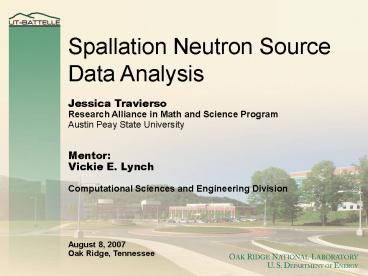Spallation Neutron Source Data Analysis - PowerPoint PPT Presentation
1 / 18
Title:
Spallation Neutron Source Data Analysis
Description:
Spallation Neutron Source Data Analysis Jessica Travierso Research Alliance in Math and Science Program Austin Peay State University Mentor: Vickie E. Lynch – PowerPoint PPT presentation
Number of Views:61
Avg rating:3.0/5.0
Title: Spallation Neutron Source Data Analysis
1
Spallation Neutron Source Data Analysis
Jessica Travierso Research Alliance in Math and
Science Program Austin Peay State
University Mentor Vickie E. Lynch
Computational Sciences and Engineering
Division August 8, 2007 Oak Ridge, Tennessee
2
Outline
- Purpose
- Develop graphical user interface for fitting code
- Run on TeraGrid
- Graphical user interface (GUI)
- Need for GUI
- Data analysis for Spallation Neutron Source (SNS)
- Fitting code
- NetBeans
- Functionality
- Java
- TeraGrid
- Explain TeraGrid
- TeraGrid facilities
3
Outline
- Putting it all together
- Link GUI to code
- Add to SNS portal
- Example
- Previous program
- Future work
- More instruments
- Acknowledgements and references
- Questions
4
Purpose
- Develop a GUI for the NL2SOL fitting code
- Analyze data at SNS
- Allow scientists to fit data without having to
bother with coding or parallel computing - Run on TeraGrid from SNS portal
- Add to simulation tab in portal
5
Need for GUI
- Built for use at SNS
- Accelerator-based neutron source
- Billion project
- Most intense pulsed beams in world
- Need tools for analysis to make data useful
- Used by instrument scientists to fit experimental
data - Find trends in data
- Simulation
Spallation Neutron Source (aerial view)
6
The Code Behind the GUI
- NL2SOL
- Adaptive non-linear least-square algorithm
- Tested by Meili Chen
- Used to fit fabricated data
- Gaussian fit
7
- Instruments include
- BASIS
- SEQUOIA
- HYSPEC
- GAUSSIAN
Will have different fitting types here in future
Gathers text and values of each component
(including parameters) and sends to configuration
file
Properties window
8
Many parameters but only few can be modified now
NL2SOL code needs initial guesses to fit data
Reset button
Palette window
9
Generated and custom code
10
Functionality
- Generated code
- Use Java coding for functionality
- Jim Rome is a life saver
MAKE IT WORK!
11
TeraGrid
- TeraGrid is an open scientific discovery
infrastructure combining leadership class
resources at nine partner sites to create an
integrated, persistent computational resource. - Began in 2001, ORNL in 2003
- Funded by the National Science Foundation
-
http//teragrid.org/about/
12
TeraGrid Facilities
- San Diego Supercomputer Center
- National Center for Atmospheric Research
- Texas Advanced Computing Center
- National Center for Supercomputing Applications
- University of Chicago/ Argonne National Lab
- Purdue University
- Pittsburgh Supercomputing Center
- Indiana University
- Oak Ridge National Lab
- sites available for the fitting program
13
Putting it all together
- Code and GUI
- Link code to GUI
- SNS portal
- Add to simulation tab in portal
- Run program on TeraGrid from portal
- Run on community account
- Send results back to portal
14
SNS instrument
Visualization of raw data
Data to portal
Visualize from portal
Choose resource
Visualization of processed data
Run on TeraGrid
Visualize from portal
TeraGrid Community Account
Data to portal
15
Future work
- Analyze real data from SNS
- Use program for instruments
- Backscattering Spectrometer (BASIS)
- probing dynamic processes in various systems on
the pico- to nano-second time scale - studying some types of collective excitations in
condensed matter - Fine-Resolution Fermi Chopper Spectrometer
(SEQUOIA) - capable of selecting incident energies over the
full energy spectrum of neutrons - high-temperature superconductivity
- excitations in quantum fluids
- Hybrid Spectrometer (HYSPEC)
- optimized for measurement of excitations in small
single-crystal specimens - studies in superconductors
- quantum critical points
- Make more components editable
16
Acknowledgements and References
- Vickie Lynch- mentor
- Meili Chen- NL2SOL code
- Jim Rome- NetBeans help
- NetBeans IDE 6.0- software used to create GUI
- http//teragrid.org/about/- TeraGrid information
- DOE Office of Science- RAMS sponsor
17
THANK YOU
18
(No Transcript)































